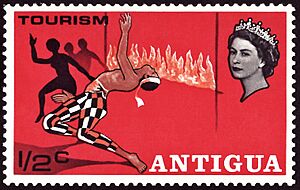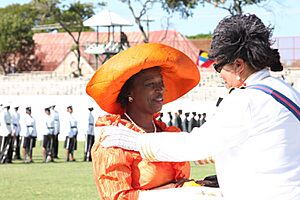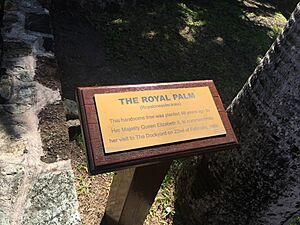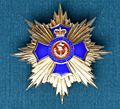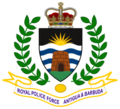Monarchy of Antigua and Barbuda facts for kids
Quick facts for kids King of Antigua and Barbuda |
|
|---|---|
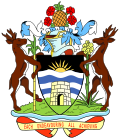
|
|
| Incumbent | |
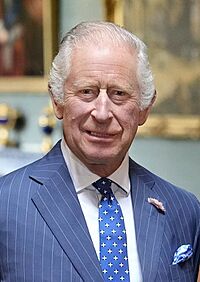 |
|
| Charles III since 8 September 2022 |
|
| Details | |
| Style | His Majesty |
| Heir apparent | William, Prince of Wales |
| First monarch | Elizabeth II |
| Formation | 1 November 1981 |
Antigua and Barbuda is a country where a monarch (a king or queen) is the official head of state. This means the monarch is the highest leader, but their role is mostly symbolic. The current King of Antigua and Barbuda is King Charles III. He became king on September 8, 2022.
Even though King Charles III is also the monarch of 14 other countries in the Commonwealth of Nations, his role in Antigua and Barbuda is special and separate. He is officially called the King of Antigua and Barbuda. He and other members of the Royal Family represent Antigua and Barbuda at events. However, only the King has a real role in the country's laws.
The King holds all the main government power. Laws passed by the Parliament of Antigua and Barbuda need his approval to become official. Most of these powers are used by elected members of parliament, government ministers, and judges. Some special powers, like firing a prime minister, are kept for emergencies.
Today, the King's role helps keep the government stable. It also acts as a safeguard against anyone trying to misuse power. The King's representative in Antigua and Barbuda is the Governor-General. This person carries out most of the King's duties.
Contents
How the Monarchy Started
The island of Antigua was explored by Christopher Columbus in 1493. It became a British colony in 1632. The island of Barbuda was first settled by Europeans in 1678.
In 1736, an enslaved man named Prince Klaas was seen as a leader by other enslaved Africans in Antigua. He planned a rebellion to make Antigua an independent country ruled by Africans. His plan was to cause an explosion at a party for King George II. This would signal other enslaved people to attack. However, the plan was discovered. Even so, Prince Klaas is remembered as a national hero in Antigua and Barbuda.
Antigua and Barbuda was part of the British Leeward Islands and then the West Indies Federation. In 1967, it became one of the West Indies Associated States, which meant it could govern itself internally. On November 1, 1981, Antigua and Barbuda became fully independent from the United Kingdom. It became a sovereign state and an independent monarchy within the Commonwealth of Nations.
Princess Margaret represented her sister, Queen Elizabeth II, at the independence celebrations. She welcomed Antigua and Barbuda to the Commonwealth. Wilfred Jacobs became the first Governor-General, representing the Queen. Princess Margaret gave the official independence documents to Prime Minister Vere Bird. She also opened the new Parliament building and gave a speech on behalf of the Queen.
The Crown of Antigua and Barbuda
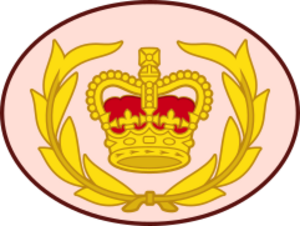
Antigua and Barbuda is one of 15 independent countries that share the same monarch. These are called Commonwealth realms. The monarch's connection to Antigua and Barbuda is completely separate from their role in any other country. Each Commonwealth realm, including Antigua and Barbuda, is independent. The King is represented in Antigua and Barbuda by the Governor-General.
Since Antigua and Barbuda became independent in 1981, the Crown has been both shared and separate. The King's role as monarch of Antigua and Barbuda is unique. It is not just a British role; it is an Antiguan and Barbudan one.
This separation is shown in several ways. For example, the King has a special Antiguan and Barbudan title. When he acts as a representative of Antigua and Barbuda, he uses the country's national symbols. Only Antiguan and Barbudan government ministers can advise the King on matters related to Antigua and Barbuda.

In Antigua and Barbuda, the government is officially called "His Majesty in Right of Antigua and Barbuda."
The King's Title
In 1981, Antigua and Barbuda passed a law about the King's title. On February 11, 1982, Queen Elizabeth II's official title became: Elizabeth the Second, by the Grace of God, Queen of Antigua and Barbuda and of Her other Realms and Territories, Head of the Commonwealth.
Since King Charles III became monarch, his title is: Charles the Third, by the Grace of God, King of Antigua and Barbuda and His other Realms and Territories, Head of the Commonwealth.
This title shows that Antigua and Barbuda is an independent monarchy. It highlights the King's specific role as the King of Antigua and Barbuda. When the King is in Antigua and Barbuda or working for the country abroad, he is usually called "King of Antigua and Barbuda."
Oath of Loyalty
People in important roles in Antigua and Barbuda swear an oath of loyalty to the King. This is a promise to be faithful to the monarch. The King, in turn, promises to govern his people fairly.
The oath of loyalty in Antigua and Barbuda is:
"I, (name), do swear that I will faithfully bear true allegiance to His Majesty King Charles the Third, His Heirs and Successors, according to law. So help me God."
Who Becomes King or Queen Next
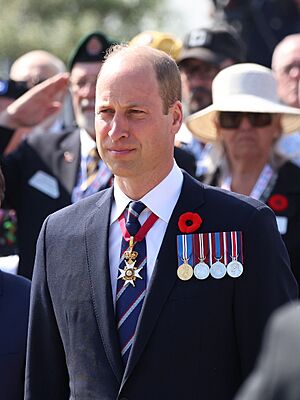
Antigua and Barbuda follows the same rules as the United Kingdom to decide who will be the next monarch.
The rules for who inherits the throne are based on several laws. These laws state that only natural, legitimate descendants of Sophia of Hanover can become monarch. They also say that the monarch cannot be a Roman Catholic and must be part of the Church of England. While these laws are controlled by the British Parliament, neither the UK nor Antigua and Barbuda can change them without all the other Commonwealth realms agreeing.
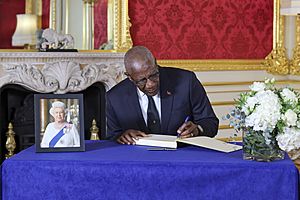
When a monarch dies or steps down, their heir immediately becomes the new monarch. There is no need for a special ceremony first. A period of mourning follows, and flags are flown at half-mast. The day of the funeral is often a public holiday. The Governor-General usually announces the new monarch publicly at Government House in St John's.
The King's Role in Government
Antigua and Barbuda's government system is similar to other Commonwealth realms. All government powers belong to the monarch. The Governor-General represents the monarch in the country. The King appoints the Governor-General based on the advice of the Prime Minister of Antigua and Barbuda. The King is the highest-ranking person in the country.
The King and Governor-General have both legal and practical roles. The government of Antigua and Barbuda is formally called His Majesty's Government in Antigua and Barbuda.
The many powers of the Crown are known as the Royal Prerogative. These include making treaties and sending ambassadors. They also include duties like defending the country and keeping the peace. Parliament does not need to approve these powers.
Running the Government
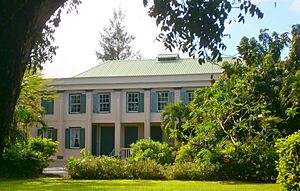
One key duty of the Crown is to appoint a prime minister. The prime minister then leads the Cabinet (a group of top ministers). They advise the King or Governor-General on how to run the government and handle foreign affairs. The King's role is mostly symbolic. The Cabinet uses the Royal Prerogative to declare war, keep peace, and direct the Antigua and Barbuda Defence Force. They also call parliament meetings and elections.
However, the Royal Prerogative belongs to the Crown, not the ministers. The Governor-General can use these powers in special situations. For example, they can dismiss a prime minister or dissolve parliament in a crisis.
The King also has a few specific duties, like appointing the Governor-General.
The Governor-General appoints the person most likely to have the support of the House of Representatives as prime minister. The Governor-General also appoints the Cabinet members, following the prime minister's advice. The King is kept informed by the Governor-General about government changes.
Dealing with Other Countries
The King's powers also cover foreign affairs. The King or Governor-General can negotiate and sign treaties and international agreements. Parliament does not need to approve these. However, a treaty cannot change Antigua and Barbuda's laws without a new law from Parliament. The Governor-General also welcomes diplomats from other countries.
Passports are also issued under the King's authority. All Antiguan and Barbudan passports are issued in the Governor-General's name.
Role in Parliament
The King is one of the three parts of the Parliament of Antigua and Barbuda. The other two parts are the Senate and the House of Representatives.
The King does not take part in making laws. However, the Governor-General gives Royal Assent (approval) to bills. This makes them laws. The Governor-General also appoints senators. They appoint eleven senators on the prime minister's advice, four on the opposition leader's advice, and one on their own. The Governor-General also calls, suspends, and dissolves parliament. After parliament is dissolved, the Governor-General issues the orders for a general election.
A new parliamentary session begins with the State Opening of Parliament. During this event, the King or Governor-General reads a speech.
All laws in Antigua and Barbuda become official only when the Governor-General gives royal assent in the King's name. This approval cannot be refused if the bill meets all legal requirements.
Role in Courts
The King is responsible for making sure justice is served for everyone. In Antigua and Barbuda, crimes are seen as offenses against the King. Court cases for serious crimes are brought in the King's name. The law says the King "can do no wrong," meaning the monarch cannot be charged with crimes in their own courts.
The Governor-General, on behalf of the King, can also grant immunity from prosecution. They can also pardon people for crimes, either before, during, or after a trial. This power is described in the Constitution.
All Supreme Court judges promise to serve the King of Antigua and Barbuda when they take office.
Trying to kill the monarch or the Governor-General is considered "high treason." This crime can lead to a death sentence.
Cultural Role
Awards and Honours
The King is seen as the source of all honours and awards. As the King of Antigua and Barbuda, he gives out awards and honours in his name. These are often given based on the advice of the Antiguan and Barbudan government ministers.
Antigua and Barbuda created four national orders in 1998: the Order of the National Hero, the Order of the Nation, the Order of Merit, and the Order of Princely Heritage. The St Edward's Crown on these awards shows that the monarchy is the source of authority. The Governor-General is the head of all these orders.
The Defence Force
The King is the highest leader of the Antigua and Barbuda Defence Force. He is the Commander-in-Chief of all the forces.
The St Edward's Crown appears on the Defence Force badges and rank symbols. This shows that the monarchy is the source of their authority.
The King of Antigua and Barbuda gives permission for people to become officers in the Defence Force. The Governor-General does this on the King's behalf.
The Police Force
The national police force is called "The Royal Police Force of Antigua and Barbuda."
The St Edward's Crown is on the Police Force's badges and rank symbols. This shows that the monarchy is the source of their authority.
Every police officer in Antigua and Barbuda must swear loyalty to the King when they join. The oath of office is:
"I, (name), do swear that I will well and truly serve Our Sovereign Lord the King as a member of the Police Force in Antigua and Barbuda without favour or affection, malice or ill-will; and that I will cause His Majesty's peace to be preserved, and will prevent to the utmost of my power, offences against the same; and that, during any time that I do or may hereafter hold any appointment in the Police Force I will to the best of my knowledge and skill discharge all the duties thereof faithfully according to law. So help me God!"
Royal Symbols
The main symbol of the monarchy is the King himself. His framed pictures are displayed in public buildings. The King also appears on special Antiguan and Barbudan stamps.
A crown is also used to show the monarchy's authority. It appears on the rank symbols of police, postal workers, and prison officers.
God Save The King is the royal anthem of Antigua and Barbuda.
New citizens of Antigua and Barbuda must promise loyalty to the King and his future heirs.
Royal Visits
Members of the Royal Family have visited Antigua and Barbuda many times.
- Princess Margaret visited in 1955.
- Queen Elizabeth The Queen Mother visited in 1964.
- Princess Alice visited in 1964.
- The Duke of Edinburgh visited in 1964.
- Queen Elizabeth II and the Duke of Edinburgh visited in 1966. They visited the capital, Saint John's, and attended a church service. They visited again in 1977 for the Queen's Silver Jubilee.
- Princess Margaret represented the Queen at the independence celebrations in 1981.
- The Queen of Antigua and Barbuda visited in 1985.
- The Duke of York visited in 2001.
- The Earl of Wessex visited in 2003 and 2006.
- The Earl and Countess of Wessex visited in 2012 for the Queen's Diamond Jubilee.
- Prince Harry visited in 2016 for the 35th anniversary of independence.
- In 2017, the Prince of Wales visited to see how communities were recovering after Hurricanes Irma and Maria.
- The Earl and Countess of Wessex visited in 2022 for the Queen's Platinum Jubilee.
Becoming a Republic
The idea of Antigua and Barbuda becoming a republic (meaning it would have a president instead of a monarch) is not a big topic of discussion. In 2020, Information Minister Melford Nicholas said the country might consider becoming a republic in the future.
In 2022, Prime Minister Gaston Browne said he hopes the country will become a republic "at some point." However, he also said it is "not on the cards" right now and will remain a monarchy for "some time." On September 10, 2022, after King Charles III became king, Prime Minister Browne stated his plan to hold a vote (referendum) within three years on becoming a republic.
List of Antiguan and Barbudan Monarchs
| Portrait | Regnal name | Reign over Antigua and Barbuda | Full name | Consort | House | |
|---|---|---|---|---|---|---|
| Start | End | |||||
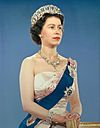 |
Elizabeth II (1926–2022) |
1 November 1981 | 8 September 2022 | Elizabeth Alexandra Mary | Philip Mountbatten | Windsor |
| Governors-general: Sir Wilfred Jacobs, Sir James Carlisle, Dame Louise Lake-Tack, Sir Rodney Williams Prime ministers: Vere Bird, Lester Bird, Baldwin Spencer, Gaston Browne |
||||||
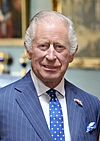 |
Charles III (b. 1948) |
8 September 2022 | present | Charles Philip Arthur George | Camilla Shand | Windsor |
| Governors-general: Sir Rodney Williams Prime ministers: Gaston Browne |
||||||
Images for kids
-
The star of the Order of Princely Heritage of Antigua and Barbuda featuring St Edward's Crown
See also
- Lists of office-holders
- List of prime ministers of Elizabeth II
- List of prime ministers of Charles III
- List of Commonwealth visits made by Elizabeth II
- Monarchies in the Americas
- List of monarchies
- King Court Tackey
 | John T. Biggers |
 | Thomas Blackshear |
 | Mark Bradford |
 | Beverly Buchanan |


